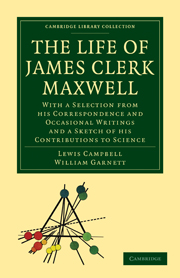 The Life of James Clerk Maxwell
The Life of James Clerk Maxwell Book contents
- Frontmatter
- PREFACE
- Contents
- LIST OF ILLUSTRATIONS
- PART I BIOGRAPHICAL OUTLINE
- CHAPTER I BIRTH AND PARENTAGE
- Note.—The Clerks of Penicuik and Maxwells of Middlebie
- CHAPTER II GLENLAIR—CHILDHOOD—1831-1841
- CHAPTER III BOYHOOD—1841-1844
- CHAPTER IV ADOLESCENCE—1844-1847
- Note.—Oval and Meloid
- CHAPTER V OPENING MANHOOD—1847-1850
- CHAPTER VI UNDERGRADUATE LIFE AT CAMBRIDGE—1850-1854
- CHAPTER VII BACHELOR-SCHOLAR AND FELLOW OF TRINITY—1854-1856
- CHAPTER VIII ESSAYS AT CAMBRIDGE—1853-1856
- CHAPTER IX DEATH OF HIS FATHER—PROFESSORSHIP AT ABERDEEN—1856-1857
- CHAPTER X ABERDEEN—MARRIAGE—1857-1860
- CHAPTER XI KING'S COLLEGE, LONDON—GLENLAIR—1860-1870
- CHAPTER XII CAMBRIDGE—1871-1879
- CHAPTER XIII ILLNESS AND DEATH—1879
- CHAPTER XIV LAST ESSAYS AT CAMBRIDGE
- PART II CONTRIBUTIONS TO SCIENCE
- PART III POEMS
- INDEX
- Plate section
CHAPTER VI - UNDERGRADUATE LIFE AT CAMBRIDGE—1850-1854
Published online by Cambridge University Press: 05 July 2011
- Frontmatter
- PREFACE
- Contents
- LIST OF ILLUSTRATIONS
- PART I BIOGRAPHICAL OUTLINE
- CHAPTER I BIRTH AND PARENTAGE
- Note.—The Clerks of Penicuik and Maxwells of Middlebie
- CHAPTER II GLENLAIR—CHILDHOOD—1831-1841
- CHAPTER III BOYHOOD—1841-1844
- CHAPTER IV ADOLESCENCE—1844-1847
- Note.—Oval and Meloid
- CHAPTER V OPENING MANHOOD—1847-1850
- CHAPTER VI UNDERGRADUATE LIFE AT CAMBRIDGE—1850-1854
- CHAPTER VII BACHELOR-SCHOLAR AND FELLOW OF TRINITY—1854-1856
- CHAPTER VIII ESSAYS AT CAMBRIDGE—1853-1856
- CHAPTER IX DEATH OF HIS FATHER—PROFESSORSHIP AT ABERDEEN—1856-1857
- CHAPTER X ABERDEEN—MARRIAGE—1857-1860
- CHAPTER XI KING'S COLLEGE, LONDON—GLENLAIR—1860-1870
- CHAPTER XII CAMBRIDGE—1871-1879
- CHAPTER XIII ILLNESS AND DEATH—1879
- CHAPTER XIV LAST ESSAYS AT CAMBRIDGE
- PART II CONTRIBUTIONS TO SCIENCE
- PART III POEMS
- INDEX
- Plate section
Summary
Before placing his son at Cambridge Mr. Clerk Maxwell had, as was usual with him, consulted various persons, including Professor James Forbes and Professor Kelland of Edinburgh, Professors Thomson and Blackburn of Glasgow, and Charles Mackenzie, afterwards Bishop of Natal, then a Lecturer of Caius College, Cambridge. Forbes strongly advised Trinity, and offered an introduction to Whewell; but after various reasons urged for Trinity, Caius, and Peter house, the decision was in favour of Peterhouse.
Maxwell's first impression of college life, like that of some other clever freshmen, was not one of unalloyed satisfaction. He was transplanted from the rural solitudes of Galloway into the midst of a society which was of curious interest to him, but did not make him feel immediately at home. He found himself amongst the freshmen spelling out Euclid again, and again “monotonously parsing” a Greek play. He had brought with him his scraps of gelatine, gutta percha, and unannealed glass, his bits of magnetised steel, and other objects, which were apt to appear to the uninitiated as “matter in the wrong place.” And this in the home of science! Nor were his experiments facilitated by the casual “dropping-in” of the average undergraduate.
His boyish spirits and his social temper, together with the novelty of the scene, and a deep-rooted presentiment of the possibilities of Cambridge, no doubt made even his first term a happy one.
- Type
- Chapter
- Information
- The Life of James Clerk MaxwellWith a Selection from his Correspondence and Occasional Writings and a Sketch of his Contributions to Science, pp. 146 - 196Publisher: Cambridge University PressPrint publication year: 2010First published in: 1882


